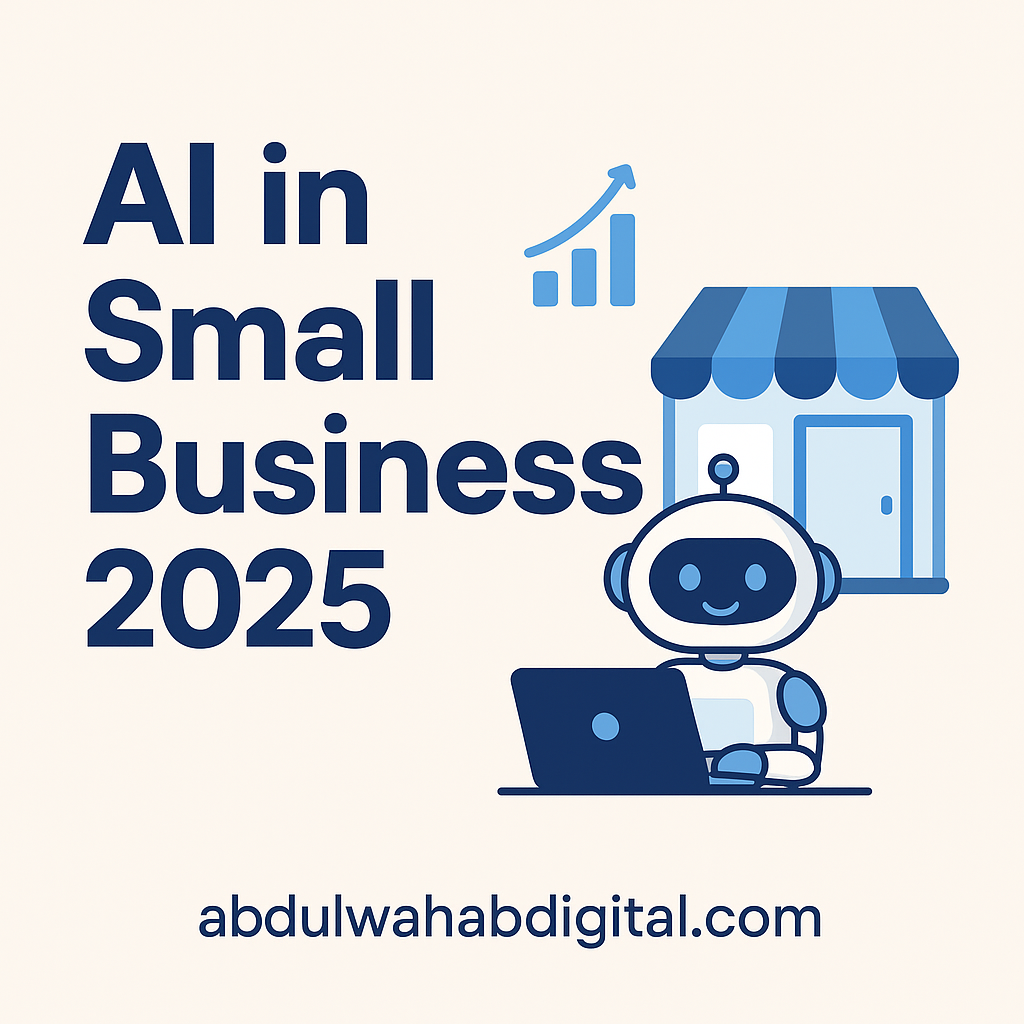The Role of AI in Small Business Growth in 2025

The Role of AI in Small Business Growth in 2025
Introduction
In 2025, Artificial Intelligence (AI) is no longer a futuristic concept reserved for tech giants. Today, small businesses across industries—whether retail, healthcare, logistics, or digital services—are adopting AI tools to compete, grow, and survive in increasingly competitive markets. From automating repetitive tasks to offering data-driven insights, AI is proving to be a powerful equalizer for small businesses.
This article explores the transformative role of AI in small business growth in 2025, covering practical use cases, affordable tools, benefits, challenges, and strategies for leveraging AI successfully.
Why Small Businesses Need AI in 2025
Small businesses often face limited resources—financial, technological, and human capital. AI addresses these constraints by providing cost-effective solutions to boost productivity and revenue.
Time Efficiency: Automating routine tasks saves hours weekly.
Cost Savings: AI reduces the need for large teams by optimizing workflows.
Customer Retention: AI helps businesses better understand and serve their audience.
Competitive Edge: With AI, small firms can compete with larger players in ways that were once impossible.
Key Ways AI Is Transforming Small Businesses in 2025
- Customer Support with AI Chatbots
AI-driven chatbots are now essential for small businesses. Tools like ChatGPT-powered bots, Tidio, and Drift handle customer inquiries 24/7, reducing the need for full-time support staff. In 2025, these chatbots don’t just respond—they provide personalized recommendations and even upsell products.
Example: A local bakery uses a chatbot on WhatsApp to take orders, suggest best-selling items, and confirm deliveries automatically.
- Smarter Marketing with AI
AI tools analyze customer behavior to create personalized marketing campaigns. Platforms like Jasper AI, Copy.ai, and HubSpot AI generate compelling ad copy, blogs, and email campaigns tailored to customer needs.
Benefits:
AI analyzes past purchase history to suggest the right promotions.
Small businesses can run ads targeted more precisely than ever before.
Predictive analytics help forecast demand for seasonal products.
- Inventory and Supply Chain Management
For retail and logistics-based businesses, AI-powered inventory systems like Zoho Inventory and TradeGecko AI predict stock shortages, automate reorders, and reduce waste.
Impact:
Prevents “out of stock” losses.
Minimizes holding costs.
Ensures just-in-time deliveries.
- Financial Management and Fraud Detection
AI finance apps, such as QuickBooks AI and Xero AI Assistant, automatically categorize expenses, predict cash flow issues, and even provide tax filing assistance. Fraud detection AI tools flag suspicious transactions to protect businesses.
Example: A small e-commerce brand uses AI-driven fraud detection to prevent chargebacks and online scams, saving thousands yearly.
- AI in Hiring and HR Management
Recruitment is a challenge for small businesses, but AI simplifies it. Platforms like HireVue AI screen resumes, conduct initial interview assessments, and identify candidates who fit company culture.
HR tools also monitor employee performance and suggest training programs tailored to individual needs.
- Personalized Customer Experiences
AI helps small businesses customize customer journeys. From Netflix-style product recommendations to AI-driven loyalty programs, personalization is no longer limited to large corporations.
Example: A small clothing store uses AI to suggest outfits based on weather, customer purchase history, and trending styles.
Affordable AI Tools for Small Businesses in 2025
Here are some budget-friendly AI tools:
Canva AI – Create social media posts, ads, and designs in seconds.
Pictory AI – Turn blogs into marketing videos.
Grammarly AI – Polish content and communication.
Notion AI – Organize workflows and manage projects.
ChatGPT – Customer support, content creation, and automation.
Benefits of AI Adoption for Small Businesses
- Increased Productivity – Automates repetitive tasks.
- Data-Driven Insights – Better decision-making with analytics.
- Cost Savings – Reduces labor and resource waste.
- Scalability – Helps businesses expand without significant overheads.
- Customer Loyalty – Personalized experiences increase retention.
Challenges Small Businesses Face with AI
While AI offers numerous advantages, small businesses must overcome challenges such as:
Initial Learning Curve: Owners may need training to adopt AI tools effectively.
Data Privacy Concerns: Customers want reassurance their data is secure.
Integration Costs: Some advanced AI systems still require investment.
Tip: Start small with affordable, user-friendly AI tools, and scale up as your business grows.
Strategies to Leverage AI for Growth
- Start with One Problem: Identify your most pressing challenge (marketing, inventory, or support) and solve it with AI.
- Choose Affordable Tools: Begin with free trials before committing.
- Educate Your Team: Train staff on AI adoption for smoother integration.
- Measure ROI: Track how AI impacts revenue, customer engagement, and cost savings.
- Stay Updated: AI evolves quickly—keep an eye on new tools.
Conclusion
In 2025, AI is no longer a luxury—it’s a necessity for small businesses. From automating daily operations to providing deep customer insights, AI gives small enterprises the power to compete with larger rivals. The businesses that embrace AI today are setting themselves up for sustainable growth tomorrow.
Whether you’re running a local shop, an online store, or a service-based company, AI tools can help you save time, cut costs, and increase customer loyalty. The future of small business success is closely tied to how effectively entrepreneurs leverage AI.